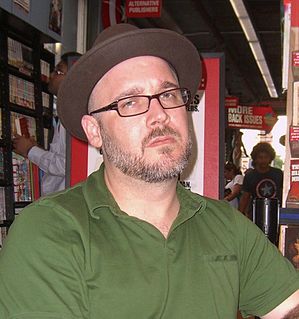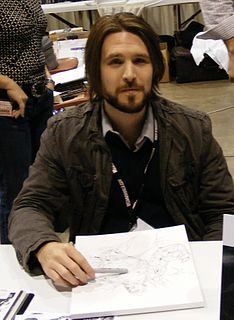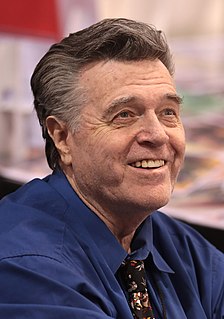A Quote by Ryan North
ComicsAlliance asked if I wanted to do some holiday comics using a new layout and I said ‘HELLO, NEVER IN MY NEAR-DECADE OF MAKING COMICS HAVE I EVER DONE THIS, so actually I’m really glad you asked!’
Related Quotes
I had done a couple TV pilots, and a friend of mine wanted to leave comics and come work in Hollywood, and I said, "Well, you've got to understand that when you sell a TV pilot, imagine if you turned in the best issue of Batman ever, and DC was like, 'Well we love this, but we can't publish it because we have to publish this other thing by this other person." The odds are really long on getting anything made, so if you come from comics and you're still making a living in comics, that really helps because you're not desperate for someone's permission to write for a living.
In early comics, you see the amazing awkwardness and bizarre reasoning in the storyline, and it's because comics hadn't really been invented yet. There was no format for them to follow. They were just making it up. So I try to incorporate that kind of awkwardness in my comics quite frequently, which is odd. In some ways, I can't be as awkward as I'd like. But I do think that's one way in which my comics are unusual, because I will try to make the artwork look bad, occasionally.
Storytelling is one of comics' esthetic hurdles at the moment, which was the novelist's problem 150 years ago: namely, to take comics from storytelling into that of "writing," the major distinction between the two to me being that the former gives one the facts, but the latter tries to recreate the sensation and complexities of life within the fluidity of consciousness and experience. As far as I'm concerned, that's really all I've been trying to do formally for the past decade or more with comics, and it's certainly time-consuming, since it has to be done with drawings, not words.
With comics, you can only really learn what you're doing wrong or what works best when you see your work published. I've been publishing comics since my 20s, and still, when I flip through any of my new comics, I still only see the things that I wish I'd done better. But that's how you learn, by seeing it.
I had done an interview with 'Hello' magazine. In it, they asked me if I was going to marry Emily Blunt. Of course, what was I going to say? I said, 'Oh yeah I am going to marry her and I love her and all of this stuff.' It's true. I was making a joke. They said to me, 'Have you asked her?' I said, 'Have I? Maybe I am asking her through the magazine.'
There are a lot of good comics, no doubt, but as far as the quality of the comics goes, I think what you have is a bunch of situational comics - there are black comics that work only black crowds, gay comics that do only gay crowds, and southern comics that only work down South, and so on with Asian, Latino, Indian, midgets, etc. The previous generation's comics were better because they had to make everybody laugh.
When I was asked by Pacific Comics for an original creator-owned series, my first choice of those several characters was Ms. Mystic. Since I always try to advance the work of other younger creators, I asked the young Mike Nasser if he'd like to join me in this project. He said yes. Mike created nothing!
I never feel there's anything I can't do with comics. There are certain things in comics that you can't do in any other medium: for instance, in Mister Wonderful, Marshall's narration overlaps the events as they're going on. That would be difficult in film; you could blot speech out with a voiceover, but it wouldn't have the same effect. That's always of interest, to see what new things you can do in comics form.





































